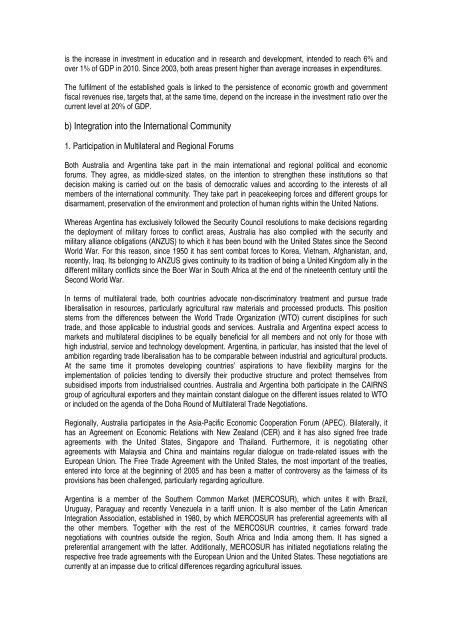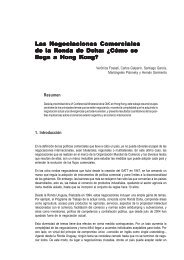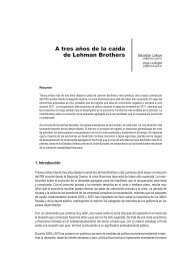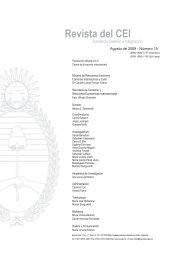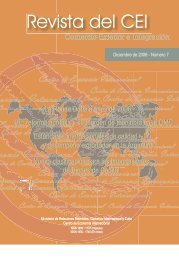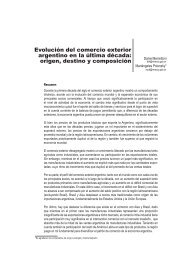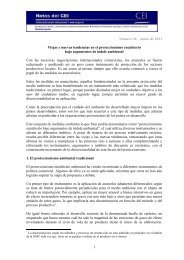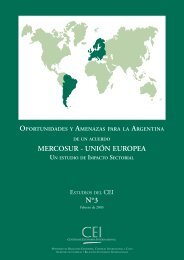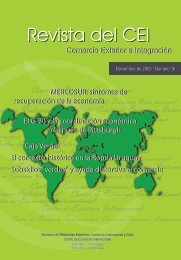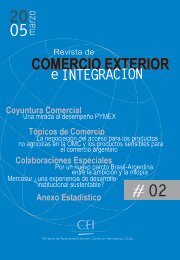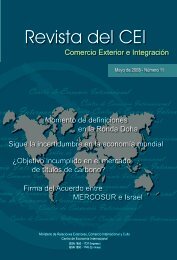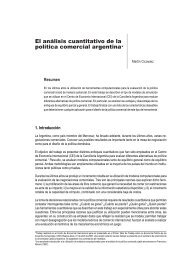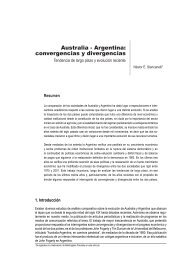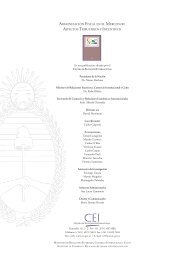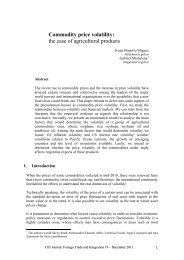Revista del CEI - Centro de EconomÃa Internacional
Revista del CEI - Centro de EconomÃa Internacional
Revista del CEI - Centro de EconomÃa Internacional
You also want an ePaper? Increase the reach of your titles
YUMPU automatically turns print PDFs into web optimized ePapers that Google loves.
is the increase in investment in education and in research and <strong>de</strong>velopment, inten<strong>de</strong>d to reach 6% andover 1% of GDP in 2010. Since 2003, both areas present higher than average increases in expenditures.The fulfilment of the established goals is linked to the persistence of economic growth and governmentfiscal revenues rise, targets that, at the same time, <strong>de</strong>pend on the increase in the investment ratio over thecurrent level at 20% of GDP.b) Integration into the International Community1. Participation in Multilateral and Regional ForumsBoth Australia and Argentina take part in the main international and regional political and economicforums. They agree, as middle-sized states, on the intention to strengthen these institutions so that<strong>de</strong>cision making is carried out on the basis of <strong>de</strong>mocratic values and according to the interests of allmembers of the international community. They take part in peacekeeping forces and different groups fordisarmament, preservation of the environment and protection of human rights within the United Nations.Whereas Argentina has exclusively followed the Security Council resolutions to make <strong>de</strong>cisions regardingthe <strong>de</strong>ployment of military forces to conflict areas, Australia has also complied with the security andmilitary alliance obligations (ANZUS) to which it has been bound with the United States since the SecondWorld War. For this reason, since 1950 it has sent combat forces to Korea, Vietnam, Afghanistan, and,recently, Iraq. Its belonging to ANZUS gives continuity to its tradition of being a United Kingdom ally in thedifferent military conflicts since the Boer War in South Africa at the end of the nineteenth century until theSecond World War.In terms of multilateral tra<strong>de</strong>, both countries advocate non-discriminatory treatment and pursue tra<strong><strong>de</strong>l</strong>iberalisation in resources, particularly agricultural raw materials and processed products. This positionstems from the differences between the World Tra<strong>de</strong> Organization (WTO) current disciplines for suchtra<strong>de</strong>, and those applicable to industrial goods and services. Australia and Argentina expect access tomarkets and multilateral disciplines to be equally beneficial for all members and not only for those withhigh industrial, service and technology <strong>de</strong>velopment. Argentina, in particular, has insisted that the level ofambition regarding tra<strong>de</strong> liberalisation has to be comparable between industrial and agricultural products.At the same time it promotes <strong>de</strong>veloping countries’ aspirations to have flexibility margins for theimplementation of policies tending to diversify their productive structure and protect themselves fromsubsidised imports from industrialised countries. Australia and Argentina both participate in the CAIRNSgroup of agricultural exporters and they maintain constant dialogue on the different issues related to WTOor inclu<strong>de</strong>d on the agenda of the Doha Round of Multilateral Tra<strong>de</strong> Negotiations.Regionally, Australia participates in the Asia-Pacific Economic Cooperation Forum (APEC). Bilaterally, ithas an Agreement on Economic Relations with New Zealand (CER) and it has also signed free tra<strong>de</strong>agreements with the United States, Singapore and Thailand. Furthermore, it is negotiating otheragreements with Malaysia and China and maintains regular dialogue on tra<strong>de</strong>-related issues with theEuropean Union. The Free Tra<strong>de</strong> Agreement with the United States, the most important of the treaties,entered into force at the beginning of 2005 and has been a matter of controversy as the fairness of itsprovisions has been challenged, particularly regarding agriculture.Argentina is a member of the Southern Common Market (MERCOSUR), which unites it with Brazil,Uruguay, Paraguay and recently Venezuela in a tariff union. It is also member of the Latin AmericanIntegration Association, established in 1980, by which MERCOSUR has preferential agreements with allthe other members. Together with the rest of the MERCOSUR countries, it carries forward tra<strong>de</strong>negotiations with countries outsi<strong>de</strong> the region, South Africa and India among them. It has signed apreferential arrangement with the latter. Additionally, MERCOSUR has initiated negotiations relating therespective free tra<strong>de</strong> agreements with the European Union and the United States. These negotiations arecurrently at an impasse due to critical differences regarding agricultural issues.


